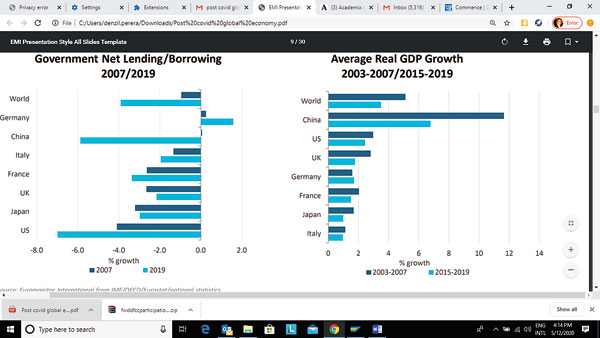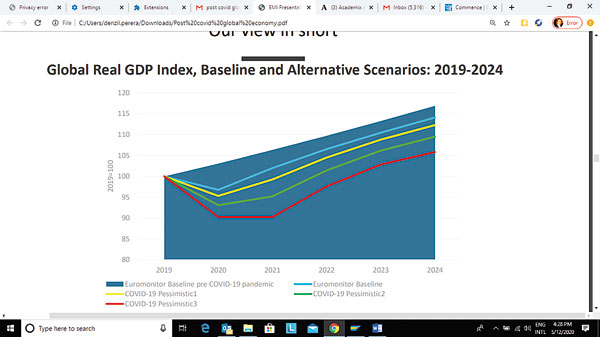What will happen in 2020 and beyond?
View(s):Analysis and explanation on post-Covid economy in 2020 and beyond Based on Euromonitor Predictions
The whole world was shaken by Covid-19 and almost all the countries, kingdoms, villages and valleys are under threat by now.
There is no debate that there has never been anything like Covid-19 which could change the way the world operates during the last ten decades.
What we are going through is unprecedented but what is going to happen beyond this is foreseeable. The whole world is going to take a U-turn and go back to basics. Of course there will be organizations, countries and people who are going to go against the tide and win but it’s time for us to take a look at what it’s going to be post-covid.

As it’s evident, for the first time in the last 50 years or so the world is going to have a negative growth. As opposed to a +5.8% growth forecasted for 2020 in China, they will have to settle for +0.5% growth. As opposed to a +3% growth forecasted for this year, the whole world is going to have a -3% (Negative) growth, in other words a reduction in growth. USA is expecting it to be -5.8% as opposed to its original plan of +1.7% growth. Emerging economies such as ours expected +3 to +4% growth will end up with negative growth of -0.9% – 1% which will have a negative impact on the overall social well-being. Demand for non-essentials will fade away and the demand for essentials will increase as a matter of fact.

As it’s evident in the graph above, T0 denotes the year 2020 in which the pandemic occurred and when the same is compared with the global financial crisis, the impact was not as bad as of the pandemic. A complete halt in many sectors across countries is unprecedented. Whilst the pandemic has brought worse results it shows that both would take more or less a similar time to recover as uncertainty about future recovery and financial shocks could exacerbate the crisis. The length of time it takes to recover has an impact on long-term output, productivity and consumer habits. It should be noted that the global economy has been in a worse situation in 2019 (prior to the pandemic) than that of the global crisis (2007). The below graph shows the real GDP growth of certain countries and the world,

As Euro-monitor forecasts, the world is going to experience the worst economic growth after WW-II as COVID-19 will severely impact both the supply and demand sides of the economy.
From bad to worse

Denzeil Perera
As Euro-monitor predicts, we are yet to experience the worse economic impact of the pandemic. Predictions say; COVID-19 social distancing restrictions will be gradually removed in the 2nd half of 2020 and by this time around 1-10% of the global population will get infected and the mortality rate of the virus will average 0.8% globally. “In our baseline view the pandemic peaks by June-July 2020’’ says Euro-monitor. However till the end of September 2020, the situation will prevail in the same way as it is now. It will take about two years for the economies to recover.
This could be due to various reasons such as; Declining consumption and investment. Greater mismatch between private sector cash-flow problems and government fiscal/credit support programmes, current short-term travel bans growing out into long-term protectionist, rising default rates and borrowing costs/risk triggering a financial crisis, the pandemic lasting longer and infects more people etc. Also the emerging markets will get the pandemic spreading faster than before if a second wave occurs.

Global Real GDP Index, Baseline and Alternative Scenarios: 2019-2024
Impact on the B2B sector
B2B sector drives economies as it’s the supply source for many industries in many economies. When it comes to B2B sector even in Sri Lanka it plays a huge role in the economy. But with the decreased consumption and social distancing, as the demand levels from the end-consumer reduced, it will have an adverse impact on the B2B sector as the sector has a derivative demand from the consumer sector. Sri Lanka is a key supplier of solid tyres to the European and the North American markets. The drop in demand in those regions will have an impact on the local manufacturers. Same applies to ready-made garments and branded clothing manufacturers. China, United States and Germany are the key suppliers for the B2B sector as far as the raw material market is concerned. A drastic drop will be expected in the sectors as depicted bellow.
Compared to China and USA the impact on the B2B industries will be as follows,
Source: Euromonitor
Source: Euromonitor
Long-term impacts on economies
Global consumer expenditure is set to decline by 4.3% in real terms year-on-year in 2020. The COVID-19 pandemic will bring about lasting changes in consumer attitudes and behavior such as: long-term increase in precautionary savings, falling consumption rates, increasing frugality. Older consumers will have to resort to online grocery shopping. COVID-19 will be a catalyst for a permanent shift to a cashless world. At the corporate level there will be changes such as: automation of the labour force, global – decoupling and diversified supply chains. Working from home/ at home will continue as a new trend as it allows females to strike a good balance between family front and office work. I will also encouraged by the employers as a mechanism of controlling overheads. Graph below depicts the impact on categories as far as the consumer market is concerned.
What to Expect
COVID-19 will bring the global economy to a deep recession but the exact magnitude of it will depend on the length of COVID-19 restrictions. Countries will have to look at significant fiscal stimulus to stabilise the economic downturn. COVID-19 highlights the need for more robust government and business planning which was not highlighted before the pandemic and also it has already highlighted the importance of the health sector. The COVID-19 pandemic is likely to leave a lasting impact in the global economic structure and consumer behavior which will in the end take people away from consumerism.
The realization of the fact that over consumption-based happiness is not the way forward for sustainable and lasting happiness. Health will surpass the importance of wealth during post-pandemic and people will learn to appreciate what they already consume than dreaming of what they never get to experience.
Online social media influencers will have a thick chance in spreading consumerism in the future. People will become more religious and will live with a better and deeper understanding of the true meaning of life and it will in return make them be more empathetic and more socially aware than before. In five years to come the world will be a better place than how it would have been without the pandemic.
Living with the realization that happiness is not positively correlated to flamboyant lifestyle and overly consumption and luxury will bring a total new perspective to life of many. Luxury will no longer be about paying exorbitant prices for outer appearance but it will be more about finding inner peace and self-actualization through wisdom and understanding of the world and worldly matters. But of course there will be a fraction which would never see the truth.



